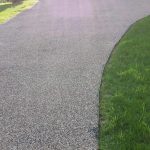Introduction
When it comes to durable and cost-effective road surfaces, tar and chip road construction stands out as a reliable choice. This paving method combines hot liquid asphalt with stone chips, creating a sturdy surface with excellent traction and low maintenance requirements. Whether for driveways, farm roads, or commercial applications, choosing the right materials is essential to ensure longevity and performance.
At JR Paving & Construction Co. Inc., we specialize in high-quality paving solutions, helping businesses and homeowners make informed decisions about their paving materials. In this guide, we’ll explore the best materials for tar and chip roads, their benefits, and why they’re an excellent alternative to traditional asphalt.

What is the Best Material for Road Construction?
Selecting the right materials for tar and chip paving is crucial to achieving a long-lasting, weather-resistant surface. The key materials used in tar and chip road construction include:
1. Bitumen (Tar)
- Acts as a binding agent that holds the stone chips together.
- Typically made from petroleum-based asphalt cement.
- Provides waterproofing properties and ensures the integrity of the road.
2. Aggregate (Stone Chips)
- The top layer of tar and chip roads consists of small stones or crushed rock.
- Common choices include limestone, granite, and gravel.
- Properly graded aggregate ensures smooth application and long-lasting performance.
3. Gravel Base
- A strong sub-base supports the entire pavement structure.
- Must be well compacted to prevent shifting or sinking over time.
- Ensures proper drainage, reducing pothole formation.
4. Seal Coating (Optional)
- A protective sealant can be applied to prolong the lifespan of the road.
- Helps prevent water infiltration and cracking.
- Enhances aesthetic appeal and reduces loose stones.
Is Tar and Chip Better Than Asphalt?
When comparing tar and chip to asphalt paving, it’s important to consider factors like cost, maintenance, and durability.
Advantages of Tar and Chip Roads:
- Lower Cost: More affordable than traditional asphalt.
- Excellent Traction: The rough surface improves grip, making it ideal for driveways and farm roads.
- Low Maintenance: Unlike asphalt, it doesn’t require regular sealcoating.
- Aesthetic Appeal: Available in different stone colors to match the surrounding landscape.
- Durability: Can last 10-15 years with proper installation and maintenance.
Advantages of Asphalt Roads:
- Smoother Surface: Provides a more polished look.
- Ideal for High-Traffic Areas: Better suited for urban roads and highways.
- More Uniform Application: Ensures a more even, seamless finish.
While both materials have their benefits, tar, and chip paving is often the preferred choice for rural areas, private roads, and residential driveways due to their cost-effectiveness and natural appearance.
How Thick Should a Tar and Chip Driveway Be?
The thickness of a tar and chip driveway depends on the expected traffic load and the condition of the existing base.
- Residential Driveways: Typically 2-3 inches thick.
- Commercial Roads: May require 4-5 inches for added durability.
- Farm or Rural Roads: Usually 3 inches to withstand heavier loads.
Proper compaction of the gravel base is essential before applying the hot liquid asphalt and stone chips to ensure stability and longevity.
What is the Tar Material for Paving Roads?
The tar used in paving roads is a type of bituminous binder that provides adhesion and water resistance. There are different types of bitumen used in tar and chip road construction, including:
1. Penetration Grade Bitumen:
- Used in hot climates to prevent melting and deformation.
- Provides flexibility and strong adhesion.
2. Emulsion Bitumen:
- A mix of bitumen and water.
- Reduces the need for high temperatures during application.
- Environmentally friendly and cost-effective.
3. Cutback Bitumen:
- Mixed with a solvent to make application easier.
- Dries faster and is useful for cold-weather applications.
The choice of bitumen depends on factors such as temperature, traffic conditions, and project budget.
Choosing the Right Commercial Paving Contractors
If you’re considering a tar and chip road for your driveway or commercial property, hiring experienced paving contractors is crucial to ensure quality installation. A reliable paving company will:
- Use high-quality materials like proper aggregates and bitumen.
- Ensure a well-compacted base for longevity.
- Apply the correct thickness for the specific use case.
- Provide cost-effective solutions and maintenance options.
At JR Paving & Construction Co Inc, we specialize in tar and chip paving, offering professional services to help you achieve a long-lasting, low-maintenance road surface. If you’re searching for commercial paving contractors, we’re here to help!
Conclusion
When constructing a tar and chip road, selecting the right paving materials is essential to ensuring a durable and cost-effective surface. The best materials include bitumen, high-quality aggregate, and a well-compacted gravel base. Whether you’re considering a new driveway or looking to improve an existing road, understanding the installation process and materials can help you make an informed decision.
For expert guidance on tar and chip paving, contact us today at JR Paving & Construction Co Inc at 800-888-9833. Our team of professional paving contractors is ready to help you create a long-lasting, visually appealing road that stands the test of time.



